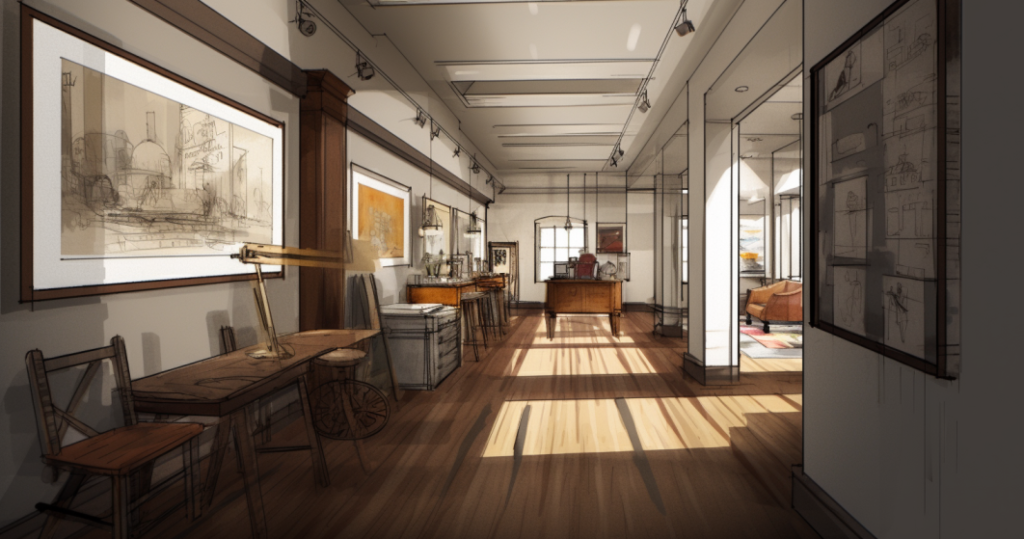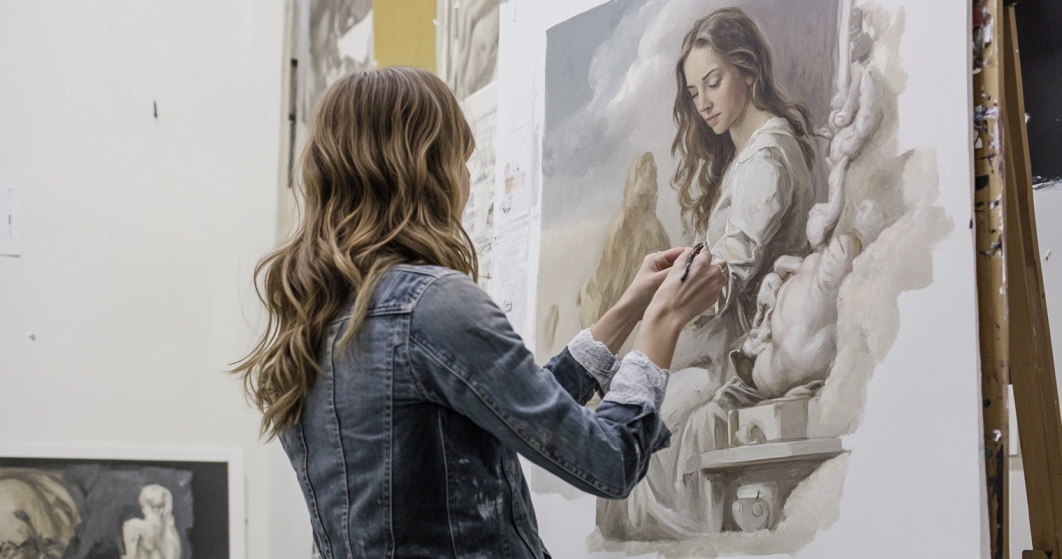Have you ever imagined a piece of art that reflects your unique story, space, or style? When you commission art, you bring that vision to life by working directly with an artist. Whether for personal enjoyment, as a heartfelt gift, or for a professional setting like a business or gallery, commissioning art offers a one-of-a-kind experience, and a truly original result.
What Is Commissioned Art?
Commissioning art means hiring an artist to create a custom piece based on your ideas, needs, and preferences. It’s a creative partnership—your concept meets the artist’s talent, and together you create something truly unique.
You might commission art for:
- A personalized gift
- A family portrait
- A custom mural or home decor
- A professional display for your office or brand
- Special events like weddings or anniversaries
It’s also a great way to support artists and become more connected to the creative process.
Commissioning Art: Two Perspectives
Commissioning art is a collaboration, and both the buyer and the artist play key roles in making it a success. Here’s what the process looks like from each side:

The Buyer’s Perspective
As someone commissioning art, your goal is to turn a personal idea into a meaningful piece. You’re looking for someone who can visually express what you imagine, even if you can’t draw it yourself.
What matters most to buyers:
- Finding an artist whose style they trust
- Being heard and understood creatively
- Receiving regular updates and having input
- Knowing the final piece reflects their vision
Buyers appreciate clear timelines, upfront pricing, and professionalism. They value artists who are reliable communicators and deliver on their promises.
The Artist’s Perspective
For artists, commissioned work is a chance to connect deeply with clients and build long-term relationships. It’s an opportunity to use their skills for personal expression, but also to meet specific expectations.
What matters most to artists:
- Clear direction and realistic expectations from the client
- Creative freedom within agreed-upon guidelines
- Respect for their process and timeline
- Timely feedback and fair compensation
Artists want clients who trust their creative voice. While flexibility is appreciated, being too vague or too controlling can make the process difficult.
When both sides bring mutual respect and clear communication, the collaboration thrives.
How to Commission Art: Step-by-Step
1. Choose the Right Artist
Browse online portfolios, social media, or visit local galleries. Look for artists whose style matches your vision. Think about medium (paint, digital, sculpture, etc.), subject matter, and tone.
2. Share Your Vision
Reach out to the artist and explain your idea. Include:
- The subject or theme
- Size and format
- Color preferences or mood
- Deadline or special date
The clearer you are, the easier it will be for the artist to bring your idea to life.
3. Discuss Details and Pricing
Agree on:
- Timeline
- Pricing
- Materials
- Shipping/delivery
- Number of revisions allowed
Make sure everything is written down in a clear contract.
4. Stay in Touch
Good communication is key. Most artists will share updates and progress photos. Be respectful and provide feedback when requested, just don’t micromanage.
5. Enjoy Your Custom Artwork
Once complete, your commissioned art will be a lasting piece with personal meaning. Display it proudly or share it as a thoughtful, unforgettable gift.ommunicate openly and foster a collaborative relationship with your chosen artist.
Understanding the Roles: Artist vs. Client

Contracts and Terms
What the Artist Does:
- Interprets the client’s vision: An artist works to understand the ideas, themes, and emotions the client wants to express.
- Uses technical and creative skills: They select the right materials, techniques, and style to match the agreed-upon concept.
- Maintains deadlines and communication: Artists should keep the client updated with progress reports and timelines, and let them know about any delays or changes.
- Delivers a high-quality final product: The final work should reflect professional standards and meet the client’s expectations as agreed.
What You Do:
- Provide a clear brief: The more detailed your vision, the more accurate the result. Include images, examples, or mood boards if possible.
- Offer constructive feedback: Be honest and helpful without micromanaging. Trust the artist’s judgment.
- Respect the creative process: Good art takes time. Avoid unnecessary pressure or scope changes once the work has started.
- Complete your responsibilities: This includes responding to messages, approving drafts, and making payments on time.
A successful commission is built on respect, trust, and clear two-way communication.
Commission Agreements: Contracts That Protect You Both
A commission Art agreement is more than just a formality—it’s a written understanding between artist and client. It clearly defines:
- Scope of work: What will be created? How big is the piece? What materials will be used?
- Timeline and deadlines: When will the initial drafts, updates, and final delivery be due?
- Pricing and payment terms: Total cost, deposit amounts, payment methods, and due dates.
- Usage rights: Who owns the original work? Can it be reproduced for merchandise or online use? Can the artist show it in their portfolio?
- Revisions and cancellation terms: How many revisions are allowed, and what happens if either party wants to cancel the project?
For physical works like murals or installations, include details about:
- Site preparation and access
- Who supplies materials or equipment
- Safety and insurance responsibilities
Having a clear agreement helps avoid misunderstandings and keeps the process professional from start to finish.
Payment and Pricing: What to Expect

Commissioned art is highly personal and can range in cost based on many factors. Here’s what to know:
Factors That Influence Cost:
- Artist’s experience and demand: Well-known or full-time artists typically charge more.
- Size and complexity: A simple ink drawing may cost much less than a large oil painting or sculpture.
- Medium and materials: Certain supplies are more expensive and may affect cost.
- Time commitment: The longer a piece takes to complete, the more it usually costs.
Common Payment Structures:
- Upfront deposit: Typically 30–50% of the total cost, paid before the artist begins.
- Staged payments: Payments made at milestones (e.g., sketch approval, midway check-in).
- Final balance: Paid when the piece is finished and approved, before delivery.
Additional Costs:
- Shipping and packaging for physical works
- Framing or presentation materials
- Rush fees if you need the work done quickly
- Digital licensing if you want to reproduce the work commercially
Discussing all these points before the project begins helps avoid surprises and sets up a smoother experience for both sides.
Why Commission Art?
Commissioning art gives you the chance to:
- Own a one-of-a-kind piece that reflects your story
- Collaborate with a talented artist
- Support creative professionals in doing what they love
- Create meaningful gifts for loved ones
Whether you want a custom pet portrait, a wall-sized mural, or a digital illustration for your brand, commission art brings ideas to life in a lasting, personal way.
FAQ – Commission Art
What is commissioned art?
Commissioned art is a custom-made piece created at your request, with your input on subject, size, and style.
How much does it cost to commission art
Prices vary based on size, detail, medium, and artist experience. Always agree on price and payment terms before work begins.
Do I own the rights to the commissioned art?
That depends on your agreement. Some artists retain copyright; others may allow reproduction rights. Always clarify this in your contract.
Can I request changes during the process?
Most artists allow 1–2 rounds of revisions. Be sure to ask about their revision policy before starting.
Ready to commission art? Don’t wait, start your search today, connect with the right artist, and bring your creative vision to life. Make something meaningful, memorable, and entirely your own.






